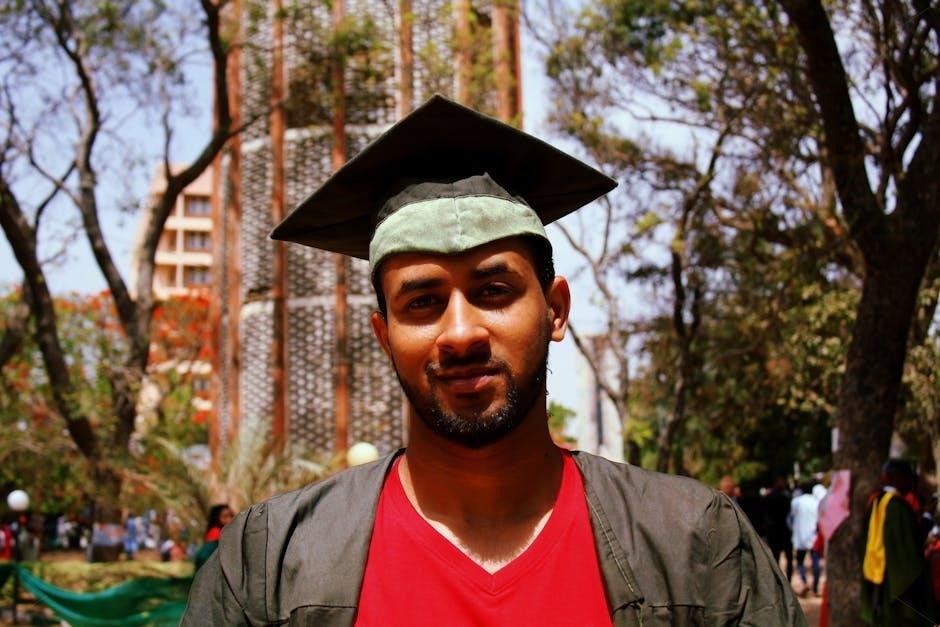This comprehensive guide provides essential strategies and real-world advice for occupational therapy students, ensuring a smooth transition from academic to clinical settings and fostering long-term professional success.
Understanding the Importance of Fieldwork in Occupational Therapy Education
Fieldwork is a cornerstone of occupational therapy education, bridging academic knowledge with real-world practice. It enables students to apply theoretical concepts in clinical settings, fostering clinical reasoning and practical skills. Positive fieldwork experiences enhance learning, while challenges can shape resilience and adaptability. Level I focuses on observation and foundational skills, while Level II involves applying advanced techniques in diverse settings. Successful fieldwork completion is crucial for professional competence, preparing students for the NBCOT exam and future practice. This hands-on training ensures students are well-equipped to meet patient needs, making fieldwork an indispensable part of becoming a skilled occupational therapist.

Key Components of Successful Fieldwork Education
Successful fieldwork education involves structured learning experiences, hands-on practice, and clinical reasoning development. It emphasizes effective communication, problem-solving, and adaptability, preparing students for real-world occupational therapy challenges.
Level I and Level II Fieldwork: Objectives and Requirements

Level I fieldwork introduces students to occupational therapy practice, focusing on observation and basic skill development. Level II fieldwork provides in-depth, hands-on experiences, applying theoretical knowledge in clinical settings. Both levels aim to enhance clinical reasoning, practical skills, and professional competence. Requirements include successful completion of all assigned fieldwork experiences, demonstration of ethical practice, and adherence to program standards. These experiences are crucial for meeting academic and professional milestones, ensuring readiness for clinical practice and graduation. Effective participation and performance in both levels are essential for mastering occupational therapy principles and achieving career success.
Preparing for Fieldwork: Strategies for Students
Effective preparation for fieldwork involves developing a structured routine, including time management and organizational skills. Students should conduct thorough research on their assigned fieldwork sites, understanding the setting, patient population, and expected roles. Packing essential materials, such as a planner, professional attire, and necessary documentation, is crucial. Staying organized with digital tools and maintaining clear communication with supervisors and peers enhances productivity. Reflecting on daily experiences through journaling or debriefing sessions fosters professional growth. Utilizing available resources, such as fieldwork survival guides and academic coordinators, ensures students are well-equipped to thrive. Proactive preparation and adaptability are key to a successful fieldwork experience.

Professional Development Through Fieldwork
Fieldwork bridges theory and practice, enhancing clinical reasoning, practical skills, and communication abilities, essential for professional growth and expertise in occupational therapy.
Enhancing Clinical Reasoning and Practical Skills
Fieldwork is a cornerstone for refining clinical reasoning and practical skills in occupational therapy. Through hands-on experiences, students apply theoretical knowledge to real-world patient care, fostering critical thinking and adaptability. The guide emphasizes the importance of observation, active participation, and reflection during fieldwork to sharpen these abilities. By engaging in diverse clinical settings, students develop the capacity to assess patient needs, design interventions, and evaluate outcomes effectively. The resource provides tips on maximizing learning opportunities, ensuring students are well-prepared to handle the complexities of clinical practice with confidence and competence.
Building Effective Communication Skills for Patient-Centered Care
Effective communication is vital for patient-centered care in occupational therapy. This guide highlights the importance of developing strong interpersonal skills during fieldwork. Students learn to articulate treatment plans clearly, actively listen to patients, and adapt communication strategies to meet diverse needs. The resource offers practical tips for building rapport, using non-verbal cues, and collaborating with interdisciplinary teams. By fostering clear and empathetic communication, students enhance patient engagement and outcomes. These skills are essential for establishing trust and ensuring that care is tailored to individual preferences and goals. The guide emphasizes that effective communication is a cornerstone of successful occupational therapy practice.

Challenges and Solutions in Occupational Therapy Fieldwork
Fieldwork presents challenges like adapting to clinical settings and managing diverse patient needs. Solutions include effective time management, self-care practices, and seeking guidance from supervisors to enhance resilience and professionalism.
Common Challenges Faced by Students During Fieldwork
Occupational therapy students often encounter challenges during fieldwork, including adapting to clinical settings, managing diverse patient needs, and balancing responsibilities. Time management, self-care, and navigating interpersonal dynamics with supervisors and colleagues can be daunting. Additionally, students may struggle with clinical reasoning, documentation, and applying theoretical knowledge in practical situations. Emotional stress and high expectations can also impact performance. These challenges highlight the importance of preparation, resilience, and seeking support. The guide addresses these issues with practical strategies, ensuring students are well-equipped to thrive in their fieldwork experiences and beyond.
Problem-Solving Strategies for Successful Fieldwork Experiences
Students can overcome fieldwork challenges by employing effective problem-solving strategies, such as proactive communication with supervisors and peers. Time management tools, like planners, help prioritize tasks and reduce stress. Actively seeking feedback and reflecting on experiences fosters growth and adaptability. Building strong interpersonal skills and maintaining a positive attitude are crucial for navigating diverse clinical environments. Utilizing resources, such as fieldwork survival guides, provides practical solutions for common obstacles. By staying organized, reflecting on challenges, and embracing a growth mindset, students can transform difficulties into opportunities for professional development, ensuring successful and impactful fieldwork experiences.
Resources for Successful Fieldwork Completion
Essential resources include fieldwork survival guides, planners, and the expertise of academic fieldwork coordinators, complemented by the free PDF guide for a comprehensive experience.
The Role of the Academic Fieldwork Coordinator
The academic fieldwork coordinator plays a pivotal role in facilitating successful fieldwork experiences for occupational therapy students. They guide students in selecting appropriate fieldwork sites, ensuring alignment with educational goals and ACOTE standards. Coordinators also provide resources, such as professional development plans and worksheets, to help students meet learning objectives. By fostering strong relationships with clinical sites, they ensure diverse and enriching practical opportunities. Their expertise and support are instrumental in preparing students for the transition from academia to clinical practice, equipping them with the skills and confidence needed for successful fieldwork completion and future professional success in occupational therapy.
Utilizing Fieldwork Survival Guides and Planner Tools
Fieldwork survival guides and planner tools are indispensable resources for occupational therapy students, offering structured approaches to navigate fieldwork effectively. These tools provide tips, tricks, and real-world advice, helping students transition smoothly from academic settings to clinical practice. They include comprehensive planners that guide students from initial planning steps to successful fieldwork completion, covering topics like time management, task organization, and progress documentation. By utilizing these resources, students can enhance their ability to apply theoretical knowledge in practical settings, ensuring a well-prepared and confident approach to their fieldwork experiences. These tools are essential for maximizing learning opportunities and achieving professional success in occupational therapy.

Long-Term Impact of Fieldwork on Occupational Therapy Careers
Fieldwork is vital in shaping occupational therapy careers, fostering clinical expertise and professional competence, and preparing students for long-term success in patient-centered care and evidence-based practice.
How Fieldwork Shapes Professional Competence and Clinical Expertise
Fieldwork is a transformative experience that bridges academic knowledge with real-world practice, enabling occupational therapy students to develop professional competence and clinical expertise. Through hands-on learning, students refine their practical skills, enhance clinical reasoning, and gain confidence in patient-centered care. Exposure to diverse clinical settings and patient populations broadens their understanding of evidence-based practices and cultural competence. Fieldwork fosters critical thinking and problem-solving abilities, essential for addressing complex client needs. By integrating theory with practice, students transition into capable professionals, equipped to meet the demands of modern healthcare. This experiential learning lays a strong foundation for lifelong professional growth and excellence in occupational therapy careers.
Downloading the Successful Occupational Therapy Fieldwork Student Guide
Access the free PDF guide, The Successful Occupational Therapy Fieldwork Student by Karen Sladyk, to gain essential tips and strategies for thriving in fieldwork experiences.
Accessing the Free PDF Resource for OT Students
The Successful Occupational Therapy Fieldwork Student Guide is available as a free PDF download, offering OT students a wealth of practical advice, real-world examples, and strategies for excelling in fieldwork. This comprehensive guide, authored by Karen Sladyk, is designed to support students from the initial stages of preparation to the successful completion of Level I and Level II fieldwork. Packed with tips, tools, and insights, it serves as an indispensable resource for navigating the challenges of clinical practice. Students can easily access the guide online, ensuring they are well-prepared to meet the demands of their fieldwork experiences and build a strong foundation for their future careers in occupational therapy.
